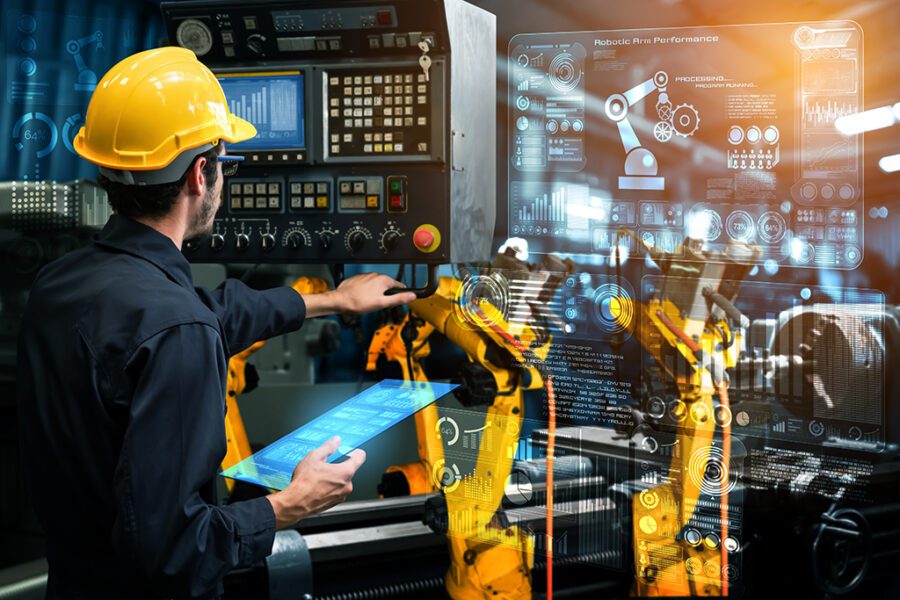
The fourth industrial revolution has been a game-changer, with the global economy’s expansion driving the adoption of new technologies across sectors. Manufacturers are using AI software in product design, production, supply chain, and logistics. AI analytics and data are helping in improving product quality and efficiency. Advances in machine learning, artificial intelligence (AI), and Big Data have initiated an algorithm-based era. Today companies are able to automate multiple tasks, cutting down on errors as well as downtime and expenditures associated with them using AI. Not only does AI provide self-generated decision-making capabilities but it gathers data, identifies patterns in data, and provides recommendations. AI enables machines to make decisions without the need for human intervention. Although humans are not perfect but are much more efficient at performing certain tasks.
Humans are not equipped with the skills to process data and the complex patterns that appear within large datasets. AI easily sorts data from a manufacturing machine and identifies outliers in the data that clearly indicate if the machine requires maintenance in the coming weeks. AI can complete this task in a fraction of the time that a human would spend analyzing the data. Like many other sectors, the manufacturing industry is also using AI in different ways like predicting maintenance, generative design, and market predictions. Since everything has its advantages and disadvantages, AI being such an asset has some pros and cons as well.
Pros of AI in Manufacturing
1. Predictive analytics for increased production output

A predictive setup allows companies to easily apply a predict-and-fix maintenance model. AI finds anomalies faster and suggests tools and solutions to correct the problem. This helps manufacturers to schedule production which will reduce downtime and enhance production output. A report from Mckinsey says that an AI predictive maintenance model can increase productivity by 20% and can decrease maintenance costs by 10Having prior knowledge of downtime can prevent a sudden halt in production when a machine part or system fails, as one will be able to solve the problem before it occurs. Using AI can avoid the expense that arises from turning machines off. The manufacturing sector has a large volume of data. AI algorithms can assess any malfunction in machines. Equipment disruptions are analyzed or monitored by the data kept in the cloud.
2. AI enables higher quality
Manufacturing companies are finding it difficult to maintain high levels of quality while also adhering to quality regulations and standards. Increasing production without addressing quality can lead to defects that can seriously damage a company’s brand in addition to being a costly expense. AI ensures that the best quality should be maintained throughout the manufacturing process.
AI algorithms can notify workers of production faults that could potentially create quality issues in the future. By working on those issues manufacturers can maintain quality levels. AI enables a more innovative production process and better product quality. It also reduces process downtime and increases productivity. For instance, tracking sensors could be used in logistics and haulage, it will help to monitor location, take stock, freight charges, and more. According to various published reports, automation of inventory improves services by 16%. At the same time, inventory turnovers are likely to be increased by 25%.
3. Ever-changing market adaptability
Apart from production, there are other significant aspects of manufacturing where AI plays a key role. These include supply chains, monitoring, customer behavior, change patterns, and predicting possible market changes. All this leads to strategizing toward better products and other cost management processes. Additionally, manufacturers can use AI algorithms to judge market demands. These estimates are possible because AI uses the information gathered through consumer behavior, inventory of raw materials, and other manufacturing processes.
4. AI can enhance production designs
AI is redefining the way products are developed and designed. For instance, one method for designers and engineers is to integrate the AI algorithm in the process. The summary data would include things like restrictions and parameters for types of materials, available production methods, time constraints, and budget limitations.
Cons of AI in Manufacturing
1. AI can be expensive
Adopting AI in the manufacturing sector can cut labor costs but the initial implementation of AI can be pretty costly, especially in startups and small companies. Initially, there will be ongoing maintenance costs as well as expenses to protect systems from cyberattacks as ensuring cybersecurity is also important.
2. You need skillful experts
AI is an evolving field, and therefore AI experts with the requisite skills are few. Since this toolset needs regular sophisticated programming, it’s essential to consider expert availability. And also, because they are in high demand, the cost of employing them is also high.
3. AI is open to vulnerabilities
AI is vulnerable to cyberattacks, and as AI becomes more sophisticated and widespread, cybercriminals will try to come up with new hacking methods. If there is even a small gap, it can disrupt the production line. In fact, a small breach can potentially shut down an entire manufacturing business. So one should always be up-to-date with security measures and be aware of the possible cyberattack, which would be costly.
Conclusion
AI will change the Face of Manufacturing. Predictive analyses help manufacturers make more informed decisions. From product design down to customer management, there’re several advantages of artificial intelligence. All of this contributes to an increase in process quality, an optimized supply chain, adaptability, and so on. Even so, AI technology is not without drawbacks, such as high budgets and susceptibility to cyber-attacks. Since everything has its advantages and disadvantages, AI being such an asset has some pros and cons as well. However, the benefits of AI outweigh the drawbacks. Many companies are enhancing the manufacturing sector using AI, such as Aeologic Technologies.

